The Virginia-based nonprofit has created an innovative livestock curriculum to enact systemic change in impoverished areas.
Joy Powers likes to say that she didn’t choose Malawi — rather, Malawi chose her. And that relationship has laid the foundation to positively impact the lives of local residents for generations to come.
Powers, aided by her younger brother, Josh, launched the nonprofit Restore the Harvest seven years ago with the goal of creating equity through agriculture. Malawi, a landlocked nation in southeast Africa, spent nearly a century being drained of resources because of British colonization, losing the indigenous practices and knowledge that once made agriculture sustainable there.
Restore the Harvest has begun to fill that gap through training and education. It creates textbooks centered around raising livestock and using agricultural practices to strengthen the livelihoods of locals.
“I really hope we can use agriculture as a tool to leverage some of the dignity back to communities that have been with the burden of ‘us,’ of the developed world,” Powers said. “Something I’m passionate about is drawing attention as to why so many parts of Africa are impoverished. It’s not because there’s no potential. It’s not because of the people there. It’s because for a hundred years, so many resources were taken away from where they originally belonged. And so we’re just really excited to bring some of that back.”
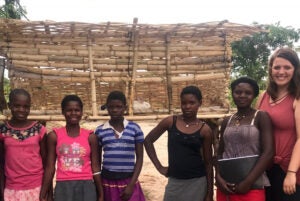
The intent is not to simply give Malawians an animal and move on to the next region; Restore the Harvest shares modern agricultural practices through community-based classes, giving instructors there the means to more broadly disseminate information. With the help of Director of Operations Jackson Longwe, that includes teaching feeding strategies, castration, deworming, and breeding for a half-dozen livestock species.
It’s a space with room to flourish. While 70 percent of Africans make their living in agriculture, the industry accounts for only 33 percent of the continent’s GDP.
The nonprofit says that agricultural stability is vital to solving hunger and famine, particularly in a world where poor nutrition causes nearly half of deaths in children younger than 5. The United Nation’s Children’s Fund (UNICEF) says that more than 3 million children die annually from malnutrition globally.
Powers’ hope is that the curriculum Restore the Harvest creates and the independence and accessibility she fosters will inspire Malawians to discover long-term success within themselves.
“I don’t want them to look at me and say, ‘I want to go to America and have a farm,’” Powers said. “I believe that we can center Malawi’s success on the native populations. I think that that is what makes Restore the Harvest different.”
Humble beginnings
Powers, 32, is a fourth-generation cattle farmer in Moneta, Virginia, and was involved in both FFA and 4-H. Her grandparents founded a tractor dealership in Bedford County the 1960s that today sells Kubota and Cub Cadet brands, as well as Solis tractors.
She began doing Christian mission trips in her teens, heading first to El Salvador before accepting an African mission that brought her to Malawi nine years ago.
“I was kind of at a crossroads and knew I wanted to do something,” Powers said.
She had never heard of Malawi before. It’s a small nation of about 21 million people. It is one of the poorest nations in the world, ranked 174 out of 189 countries on Action on Poverty’s Human Development Index. Access to clean water, sanitation, and health care are significant challenges.
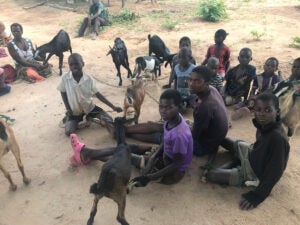
On that mission trip, Powers met Longwe, who served as a translator for the native Chichewa language and who would ultimately go on to become Restore the Harvest’s director of operations.
“I grew up in 4-H and FFA, so that mindset of creating a better tomorrow through agriculture was something that was ingrained heavily on me,” she said. “And so, I just started to see opportunities.”
She said she began to feel like agriculture was the best answer for the Malawian people, but many nonprofit groups she looked to join didn’t have the educational approach that she sought.
So, Powers and her brother created Restore the Harvest to help reframe the conversations in rural Malawi about what the future of agriculture can look like and what an intentional and self-thriving community can look like. Much of the work in those early years was centered around community projects.
Her best approach in that time became to listen before acting. What’s right for some may not always be right for others, and it took time and a willingness to set aside preconceptions for Restore the Harvest to find the footing that is helping to carry the organization forward today.
“Seven years ago it was never in the plans to write textbooks for schools. But that was a need, and that was what presented itself, and that’s what teachers asked us for,” Powers said. “They also asked us for teacher trainings. And they were right — that’s the best way to effect the most change, to work through these classrooms.”
The comprehensive classroom curriculum was developed through collaboration between agricultural experts, local farmers, and educators in Malawi. Livestock production is more universal than crop production, as well as being more accessible for locals. Upon completion of courses, students have the opportunity to get a grant, which can include rabbits and assistance with materials to build a hutch or a Boer goat to breed with the local does.
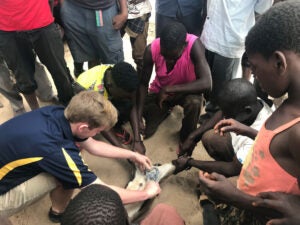
“Keeping development work communally and agriculturally centered is really the only way to honor the livelihoods, communities, and natural resources, while allowing communities to lift themselves out of extreme poverty,” said Josh Powers, who, like his sister, served as a state FFA officer. “These are farm families and have been for so for thousands of years. They deserve equity, and agricultural education is one small step toward that.”
By the end of the year, Restore the Harvest aims to have textbooks on six different species in print, written in both English and Chichewa. Plans for Spanish-language texts are also in the works, which would allow Restore the Harvest to make an impact in other countries.
“The more that we work with these communities, the more that we can learn from them,” Joy Powers said. “Because until we really look at the root cause of what’s going on in Africa and what’s going on in the agriculture in Africa and natural resources, it’s not going to change.”
Though Powers is Christian and says that her faith is what leads her to help people, she said her organization is not connected to any religion. She and her brother don’t take a salary, and none of the money they raise stays in U.S.: “Everything goes to Malawi, and that’s important for us,” she said.
Future of food and community
In 2023, Restore the Harvest relocated its headquarters from the Malawi capital of Lilongwe to a much smaller town near Salima. This was done with the goal of reaching deeper into rural regions of Malawi, where access to support and opportunity from non-governmental organizations (NGOs) is more challenging.
“This shift not only reflects our commitment to inclusivity but also aligns with our mission to empower those in the most underserved communities, ensuring that the impact of our initiatives reaches even the most remote corners of Malawi,” the nonprofit said in its 2023 annual report.
Josh Powers serves as the organization’s instruction specialist, developing through natural interactions the teaching approach that he embraces today. Some of the challenges he says they face include language barriers and communication delays, which can make collaboration more difficult.
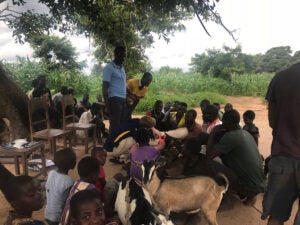
Still, throughout the past year alone, 143 Malawi students completed livestock and agribusiness trainings. They included nearly 20 high school dropouts in the village of Tikondane who learned meat rabbit production to help turn a corner in their lives. Elsewhere, at Lungumadzi Community Day Secondary School, more than two dozen students took part in a livestock training that has become a model for future ag education programs.
“The biggest thing that I’ve learned is that change is uncomfortable. We know that; we’re taught that from a young age,” Joy Powers explained. “When we’re asking and hoping and dreaming and working toward change for an entire industry, an entire country, entire marginalized people groups, somebody’s going to be uncomfortable.”
Some potential donors and faith-based partners have even kept their distance in the past year because Powers has begun to steer the conversation toward the ruinous legacy of colonization across the third world. Meanwhile, her approach as a nonprofit is more comprehensive than doling out something tangible — like money or just a livestock animal — which can be difficult for some to grasp.
She is passionate to discuss the aspects of colonization because of the impact European leaders had on disrupting cultures and communities in Africa. Resources had spent decades being redirected into export crops, and the sustenance farming that native peoples relied on was lost. Those indigenous practices remain unattainable because the land itself became so depleted and scorched.
“I think more Americans need to be a part of the global colonization conversation, and I hope that we can raise some awareness about that,” Joy Powers said.
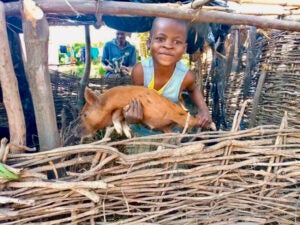
She said she’s been particularly eager to see how the young people who are being trained in agriculture and are getting their first few animals through her program will be able to progress. She envisions them leveraging these opportunities into something incredible for their villages.
“I’m really excited to see in 10 years from now where they are and to see the change that they’re making — to see how many people they’ve taught,” she said. “I want to see what their families are doing because that’s when I think we’re really going to see a major difference in these communities.”
Ryan Tipps is the founder and managing editor of AGDAILY. The Indiana native has a master’s degree in Agriculture and Life Sciences from Virginia Tech and has covered the food and farming industries at the state and national levels since 2011.



